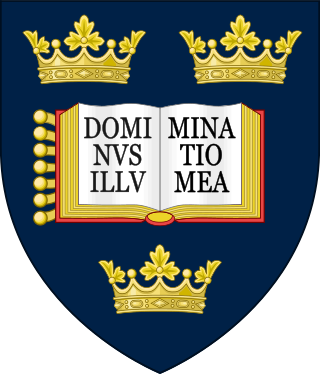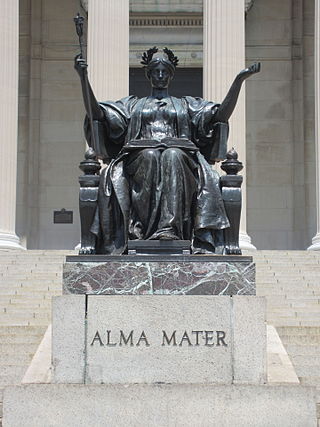The topic of this article may not meet Wikipedia's general notability guideline .(August 2023) |
Sovremennyi Gumanitarnyi University is a university in Omsk, Russia.
The topic of this article may not meet Wikipedia's general notability guideline .(August 2023) |
Sovremennyi Gumanitarnyi University is a university in Omsk, Russia.

Columbia University, officially titled as Columbia University in the City of New York, is a private Ivy League research university in New York City. Established in 1754 as King's College on the grounds of Trinity Church in Manhattan, it is the oldest institution of higher education in New York and the fifth-oldest in the United States.

The Ivy League is an American collegiate athletic conference which comprises eight private research universities in the Northeastern United States. The conference's headquarters are located in Princeton, New Jersey. The term Ivy League is typically used beyond the sports context to refer to the eight schools as a group of elite colleges with connotations of academic excellence, selectivity in admissions, and social elitism. Its members are Princeton University, Brown University, Columbia University, Cornell University, Dartmouth College, Harvard University, University of Pennsylvania, and Yale University.

Princeton University is a private Ivy League research university in Princeton, New Jersey. Founded in 1746 in Elizabeth as the College of New Jersey, Princeton is the fourth-oldest institution of higher education in the United States and one of the nine colonial colleges chartered before the American Revolution. The institution moved to Newark in 1747, and then to the current site nine years later. It officially became a university in 1896 and was subsequently renamed Princeton University.

Stanford University is a private research university in Stanford, California. The campus occupies 8,180 acres, among the largest in the United States, and enrolls over 17,000 students. Stanford is widely considered to be one of the most prestigious universities in the world. It was founded in 1885 by Leland and Jane Stanford in memory of their only child, Leland Stanford Jr., who had died of typhoid fever aged 15 the previous year. Leland was a U.S. senator and former governor of California who made his fortune as a railroad tycoon. The university admitted its first students on October 1, 1891, as a coeducational and non-denominational institution. Stanford struggled financially after the death of Leland in 1893 and again after much of the campus was damaged by the 1906 San Francisco earthquake. Following World War II, the provost of Stanford Frederick Terman inspired and supported faculty and graduates' entrepreneurialism to build a self-sufficient local industry, which would later be known as Silicon Valley.

Texas A&M University is a public, land-grant, research university in College Station, Texas. It was founded in 1876 and became the flagship institution of the Texas A&M University System in 1948. Since 2021, Texas A&M has enrolled the largest student body in the United States, and is the only university in Texas to hold simultaneous designations as a land-, sea-, and space-grant institution. It is classified among "R1: Doctoral Universities – Very high research activity" and a member of the Association of American Universities.

The University of Oxford is a collegiate research university in Oxford, England. There is evidence of teaching as early as 1096, making it the oldest university in the English-speaking world and the world's second-oldest university in continuous operation. It grew rapidly from 1167 when Henry II banned English students from attending the University of Paris. After disputes between students and Oxford townsfolk in 1209, some academics fled north-east to Cambridge where they established what became the University of Cambridge. The two English ancient universities share many common features and are jointly referred to as Oxbridge.

The University of California, Berkeley is a public land-grant research university in Berkeley, California. It was established in 1868 as the University of California and is the state's first land-grant university and the founding campus of the University of California system. Berkeley is widely regarded to be among the top public universities in the world.

Yale University is a private Ivy League research university in New Haven, Connecticut. Founded in 1701, Yale is the third-oldest institution of higher education in the United States and one of the nine colonial colleges chartered before the American Revolution. It is among the most prestigious universities in the United States.

The Atlantic Coast Conference (ACC) is a collegiate athletic conference located in the Eastern United States. Headquartered in Greensboro, North Carolina, the ACC's fifteen member universities compete in the National Collegiate Athletic Association (NCAA)'s Division I. ACC football teams compete in the NCAA Division I Football Bowl Subdivision. The ACC sponsors competition in twenty-five sports with many of its member institutions held in high regard nationally. Current members of the conference are Boston College, Clemson University, Duke University, Georgia Institute of Technology, Florida State University, North Carolina State University, Syracuse University, the University of Louisville, the University of Miami, the University of North Carolina, the University of Notre Dame, the University of Pittsburgh, the University of Virginia, Virginia Polytechnic Institute and State University, and Wake Forest University.

The Big 12 Conference is a college athletic conference headquartered in Irving, Texas. It consists of fourteen full-member universities. It is a member of Division I of the National Collegiate Athletic Association (NCAA) for all sports. Its football teams compete in the Football Bowl Subdivision, the higher of two levels of NCAA Division I football competition. Its 14 members, in the states of Florida, Iowa, Kansas, Ohio, Oklahoma, Texas, Utah, and West Virginia, include three private universities and 11 public universities. Additionally, the Big 12 has 13 affiliate members — nine for the sport of men's wrestling, one for women's equestrianism, one for women's gymnastics and two for women's rowing. The Big 12 Conference is a 501(c)(3) nonprofit organization. Brett Yormark became the new commissioner on August 1, 2022.

The Pac-12 Conference is a collegiate athletic conference that operates in the Western United States, participating in 24 sports at the NCAA Division I level. Its football teams compete in the Football Bowl Subdivision, the highest level of college football in the nation.

A Juris Doctor, a Doctor of Jurisprudence, or a Doctor of Law is a graduate-entry professional degree in law. The JD is the standard degree obtained to practice law in the United States, where there is no undergraduate professional law degree. Some jurisdictions, such as Australia, Canada and Hong Kong, offer both the JD and undergraduate qualifying law degrees.

A Bachelor of Arts is a bachelor's degree awarded for an undergraduate program in the arts, or, in some cases, other disciplines. A Bachelor of Arts degree course is generally completed in three or four years, depending on the country and institution.
A bachelor's degree or baccalaureate is an undergraduate academic degree awarded by colleges and universities upon completion of a course of study lasting three to six years. The two most common bachelor's degrees are the Bachelor of Arts (BA) and the Bachelor of Science. In some institutions and educational systems, certain bachelor's degrees can only be taken as graduate or postgraduate educations after a first degree has been completed, although more commonly the successful completion of a bachelor's degree is a prerequisite for further courses such as a master's or a doctorate.

Harvard University is a private Ivy League research university in Cambridge, Massachusetts. Founded in 1636 as Harvard College and named for its first benefactor, the Puritan clergyman John Harvard, it is the oldest institution of higher learning in the United States. Its influence, wealth, and rankings have made it one of the most prestigious universities in the world.

A university is an institution of higher education and research which awards academic degrees in several academic disciplines. Universities typically offer both undergraduate and postgraduate programs. In the United States, the designation is reserved for colleges that have a graduate school.

A Doctor of Philosophy is the most common degree at the highest academic level, awarded following a course of study and research. PhDs are awarded for programs across the whole breadth of academic fields. Because it is an earned research degree, those studying for a PhD are required to produce original research that expands the boundaries of knowledge, normally in the form of a dissertation, and defend their work before a panel of other experts in the field. The completion of a PhD is typically required for employment as a university professor, researcher, or scientist in many fields. Individuals who have earned the Doctor of Philosophy degree use the title Doctor, although the etiquette associated with this usage may be subject to the professional ethics of the particular scholarly field, culture, or society. Those who teach at universities or work in academic, educational, or research fields are usually addressed by this title "professionally and socially in a salutation or conversation." Alternatively, holders may use post-nominal letters such as "Ph.D.", "PhD", or "DPhil", depending on the awarding institution. It is, however, considered incorrect to use both the title and post-nominals together.

A Bachelor of Science is a bachelor's degree awarded for programs that generally last three to five years.

The University of Cambridge is a public collegiate research university in Cambridge, England. Founded in 1209, the University of Cambridge is the third-oldest university in continuous operation. The university's founding followed the arrival of scholars who left the University of Oxford for Cambridge after a dispute with local townspeople. The two ancient English universities, although sometimes described as rivals, share many common features and are often jointly referred to as Oxbridge. In 1231, 22 years after its founding, the university was recognised with a royal charter granted by King Henry III.